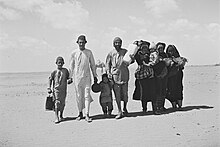1947 anti-Jewish riots in Aleppo

The 1947 anti-Jewish riots in Aleppo were an attack on Syrian Jews in Aleppo, Syria in December 1947, following the United Nations vote in favour of partitioning Palestine. The attack, a part of an anti-Jewish wave of unrest across the Middle East and North Africa, resulted in some 75 Jews murdered and several hundred wounded.[1] In the aftermath of the riots, half the city's Jewish population fled the city.[2]
History
| Part of a series on |
| Jewish exodus from the Muslim world |
|---|
 |
| Background |
| Antisemitism in the Arab world |
| Exodus by country |
| Remembrance |
| Related topics |
Syria gained independence from France in April 1946. The Haganah's illegal immigration operative Akiva Feinstein wrote in 1947 that the new Syrian government then commenced persecuting the Jewish minority,[3] that all Jewish clerks working for the French bureaucracy were fired, and the government tried to stifle Jewish businesses.[3] At the time of the United Nations vote on November 29, 1947, the Jewish community in Aleppo numbered around 10,000 and went back around two thousand years.[4]
After the vote in favour of the partition of Palestine, the government abetted and organised Aleppo's Arab inhabitants to attack the city's Jewish population.[3][4][5] The exact number of those killed remains unknown, but estimates are put at around 75, with several hundred wounded.[1][5][6] Ten synagogues, five schools, an orphanage and a youth club, along with several Jewish shops and 150 houses were set ablaze and destroyed.[7] Damaged property was estimated to be valued at US$2.5m.[8][9] During the pogrom the Aleppo Codex, an important medieval manuscript of the Torah, was lost and feared destroyed. The book reappeared (with 40% of pages missing) in Israel in 1958.[10]
Following the attack, the Jewish community went into a steep decline. Wealthy Jews escaped the day after the pogrom and many more fled in small groups in subsequent months.[2][4] Their property was forfeited and on December 22 the Syrian Government enacted a law forbidding Jews from selling their property.[3] As of 2012, no Jews live in Aleppo.[4]
See also
- 1945 Tripoli pogrom
- Farhud
- Jewish exodus from Arab and Muslim countries
- Menarsha synagogue attack
- Killings and massacres during the 1948 Palestine war
References
- ^ a b Jacob Freid (1962). Jews in the modern world. Twayne Publishers. p. 68. Retrieved 18 October 2010.
- ^ a b Colin Shindler (2008). A history of modern Israel. Cambridge University Press. p. 63. ISBN 978-0-521-61538-9. Retrieved 18 October 2010.
- ^ a b c d Itamar Leṿin (2001). Locked doors: the seizure of Jewish property in Arab countries. Greenwood Publishing Group. pp. 167–171. ISBN 978-0-275-97134-2. Retrieved 18 October 2010.
- ^ a b c d Friedman, Matti (May 15, 2012). "A Different History of Displacement and Loss: There is More Than one way to look at the Commemoration of 1948′s Palestinian Defeat and Dispersion". The Times of Israel. Retrieved 15 May 2014.
- ^ a b Hayim Tawil; Bernard Schneider (December 2009). Crown of Aleppo: The Mystery of the Oldest Hebrew Bible Codex. Jewish Publication Society. p. 163. ISBN 978-0-8276-0895-5. Retrieved 18 October 2010.
- ^ Daniel Pipes, Greater Syria: The History of an Ambition, (New York: Oxford University Press, 1990) p. 57, records 75 victims of the Aleppo massacre.
- ^ Benny Morris (2008). 1948: a history of the first Arab-Israeli war. Yale University Press. p. 412. ISBN 9780300126969. Retrieved 18 October 2010.
- ^ Andrew G. Bostom (2008). The legacy of Islamic antisemitism: from sacred texts to solemn history. Prometheus Books. p. 159. ISBN 9781591025542. Retrieved 18 October 2010.
- ^ W. A. Veenhoven (February 1977). Case Studies on Human Rights And Fundamental Freedoms. Martinus Nijhoff Publishers. p. 90. ISBN 978-90-247-1957-0. Retrieved 18 October 2010.
- ^ Ronen Bergman (July 25, 2012). "A High Holy Whodunit". The New York Times. Retrieved 2012-07-26.
